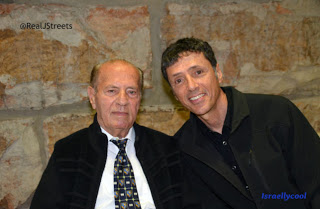
With Holocaust Memorial Day still fresh in the mind, I came across this moving testimony from a Libyan Jew who survived the war and the concentration camp of Bergen Belsen. From the blog Israellycool.
Joseph Labi was born in 1928 in Benghazi, Libya to a family of 19. He was from a proud and renowned family, the grandson of Rabbi Eliyahu Labi, a rabbi and religious court judge in Benghazi. Labi held British citizenship and had a pleasant childhood. But those pleasant memories of early childhood and even the faces of his parents are hard for him to recall.
In 1938, Italian racial laws were extended to Libya. Joseph and his fellow Jewish students were removed from their schools and transferred to a separate school branded with the Star of David. Joseph’s parents died in 1940, leaving the 12 year-old Joseph under the care of his older brothers.
In 1942, along with the Jews of Libya, Joseph’s entire family was deported to the Giado hard labor camp. The Libyan Jews were then deported to Italy, where they were interned at Castelnovo ne’ Monti. In February 1944, the Germans sent the 200 Jews, including young Joseph, to Bergen-Belsen. At first, Joseph refused to eat because the food at the camp was not kosher, but after a week of being hungry, he relented. Most children did not survive in the camps.
One of the camp’s prisoners, a religious Jew, proposed that Joseph have a bar mitzvah ceremony. “I put on tefillin,” said Joseph. “He asked me to share food with those present, but I only had a small potato. Fortunately, a woman secured some perfume. I poured some on everyone’s hand and that was my bar mitzvah.”
In March 1945, in a prisoner exchange deal, Joseph was transferred to France. From there, alone in the world, he made his way to Spain and finally to Portugal.
“When we reached Lisbon, we realized that hell was over for us,” said Labi.
On returning to Benghazi, Joseph met soldiers from the British Army’s Jewish Brigade who suggested that he go to Eretz Israel. “I went to the train station. Somebody gave me a hat and dressed me in a Jewish Brigade uniform and put a bunch of forms in my pocket,” remembers Joseph. “I boarded the train dressed as a soldier and we went to Alexandria.”
But the ordeal was still not over. Under the British Mandate, Labi had to be smuggled into Palestine. He went looking for a new home and to start a new life in several kibbutzim. Labi volunteered for the Palmach, and fought in Israel’s War of Independence in the battle for Latrun.
Despite all the adversity, persecution, and deprivation, Labi married, and he and his wife Yvonne have a son and daughter, seven grandchildren, and a great-granddaughter. He still has the tallit that he received from the army chaplain who liberated the camps. He has managed, by many “miracles,” to survive a childhood that was taken from him. A life, a town, a home and his family were destroyed. He is a survivor. One of countless numbers who suffered in the North African Nakba.
The Labi family and the other Jewish families of Libya, were forced to leave everything and sent to hard labor camps, from there sent on to concentration death camps. Many died along the way. Joseph Labi was one of the “lucky” ones to survive, build a family, and reestablish himself in Israel.

Leave a Reply